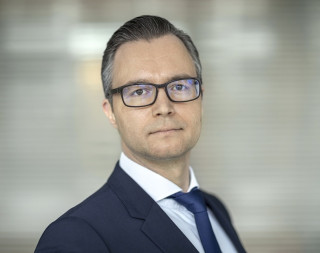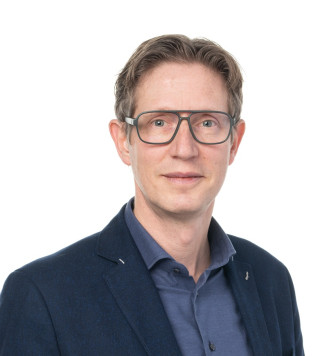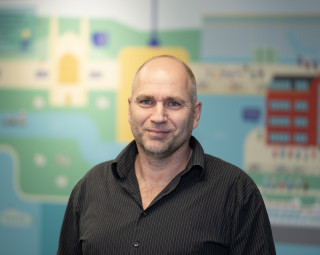"Based on the Value Compass, our procurement experts made a good assessment design."
From good intentions to firm choices: public values in procurement
“It seemed like a complicated step, but in retrospect, it was remarkably simple,” says Jan-Paul van Staalduinen, CIO of Utrecht University (UU), reflecting on how the university placed public values at the heart of a procurement process. How do other institutions approach this challenge? For SURF Magazine, we spoke with administrators about their experiences.
Public values are often reflected in policy documents and strategic plans. Translating them into concrete choices in practice is much more difficult—but certainly not impossible, as it turns out.
Urgency due to geopolitical pressure
Because of the current geopolitical situation, the public value of 'autonomy' has taken on additional connotations in recent months. Due to the unpredictable policies of US President Donald Trump - an almost daily topic in the news - there is a growing awareness that educational institutions are heavily dependent on a limited number of, mainly American, software suppliers. This makes them vulnerable: a presidential decree could result in services suddenly being unavailable, or US intelligence agencies gaining access to data.
Even without geopolitical tensions, it is important to have a digital responsibility. Institutions should be alert to vendor lock-in and realise that the privacy protection required by law in Europe cannot be taken for granted by all providers.
Taking the lead in procurement
Educational institutions should therefore continue to actively work on digital autonomy. The most important moment to take the lead is during a tender. Yet public values still rarely play a role in this, observes Jan-Paul van Staalduinen, CIO of Utrecht University. "In March 2025, during a masterclass, I was allowed to tell how we approached this. I believe we were one of the first institutions in the Netherlands," he says.
Taking the lead in procurement

Jan-Paul van Staalduinen
By the end of 2022, Utrecht University was due for a new digital learning environment. Suppliers were asked to describe in a four-page vision document how themes such as autonomy, justice, accessibility and humanity are reflected in their product and in their business philosophy.
Smart use of the Value Compass
How do you then assess the answers? Van Staalduinen was glad that just before the tender, SURF and Kennisnet's Value Compass had come out, which clearly detailed public values. "We no longer had to come up with that ourselves," he explains. "Our tender experts made a good assessment design based on that. In addition, we asked several experts, including a scientist who is heavily involved in this topic, to sit on the assessment committee."
Exclusion as a strong signal
What followed was a robust discussion: how much weight should the theme of public values be given in the tender? "Do we think 50 per cent is realistic, or only 5 per cent?" Van Staalduinen recalls. "After all, there are also other important criteria such as functionality, service level agreements and price."
"It is not bad to be dependent, but you have to be able to continue to act from your own values."
In the end, UU decided to make public values count for 15 per cent. This was also subject to the following: if a supplier scored insufficiently on public values, it was immediately dropped. "I thought that was a pretty firm decision," says Van Staalduinen, "but we were comfortable with it." Van Staalduinen is very happy with the eventual choice of Canadian provider Brightspace. He plans to follow the same approach again in subsequent tenders.
True autonomy impossible?
At the Graafschap College in Doetinchem, too, public values, AVG, dealing with data and supplier choice are regular topics of discussion. "Digitalisation is complex and requires administrative involvement and awareness," thinks Michiel Gerlagh, member of the board of governors. That was therefore an important motive for him to take SURF's Public Values course. "In the digital world, autonomy, i.e. total independence, is actually impossible. Educational institutions are dependent on American big-tech companies. That dependence is not reciprocal and that is not right."
True autonomy impossible?

Michiel Gerlagh
Gerlagh therefore thinks sovereignty is more important than autonomy. He compares it to the position of the Netherlands. "We are sovereign as a country, but totally dependent on the European Union and the world around it. That is not a bad thing, but you have to be able to continue to act on the basis of your own values."
Not yet a hard requirement
Yet at the Graafschap College, public values are not yet included as hard assessment criteria in tender processes. "In our strategic goals, we do include Sustainable Development Goals, data security and the AVG," says Gerlagh. "These are also naturally included in our procurement processes. However, we should look more sharply at sovereignty."
Although awareness is growing among educational institutions, Gerlagh says there is a risk that it remains a managerial issue. "As an administrator, you can decide that it is better to stop using WhatsApp and encourage a switch to Signal. However, many people do not see the need, so before you have convinced everyone..."
Developing digital conscience
According to Gerlagh, teachers could also pay more attention to raising awareness about such issues among their students. "Students also need tools to hold their own in the digital world. For example, what will a hairdresser soon have to deal with in terms of AI? This is not only about technology, but also about developing a digital conscience."
A good example of this is the programme 'Learning and teaching with and about ICT' from the Gelderland Professionalisation Agenda, a collaboration between all Gelderland mbo's and the HAN. The programme fits seamlessly with the objectives of the Centres for Teaching and Learning (CTLs).
Less dependence on big tech
Gerlagh strongly supports initiatives within Europe or the Netherlands to reduce dependence on US companies. As an example, he cites the development of GPT-NL, a responsible Dutch alternative to existing language models. Gerlagh does not see GPT-NL's own warning that it cannot yet match the best US models in terms of versatility as an objection.
"The question is whether you really need that enormously high quality to do practically applicable things with it," he explains. "That applies to many innovations. They promise nice applications, but do they really improve the quality of our standard of living in the end? Maybe you can achieve a higher goal with limited functionality."
"We were forced to sign a new agreement at ten times the price.”
Sleepless nights
That dependence on a supplier carries great risks was experienced by GÉANT, the European umbrella organisation of education and research networks (NRENs) to which SURF also belongs. GÉANT was faced with an absurd price increase for digital certificates - essential for the secure conduct of digital transactions - which suddenly increased the originally agreed price tenfold. Part of the problem was the special characters in various languages such as Polish and Czech, which the automated systems could not handle. As a result, someone had to look at it manually and the whole process became much more expensive than previously estimated.

Klaas Wierenga
Klaas Wierenga, Chief Information & Technology Officer at GÉANT, explains how price negotiations with the supplier broke down. "They ended up unilaterally cancelling the contract. We had two months to find an alternative, but that is far too short for a tender. As a result, we were simply put on the spot to sign a new contract for an amount 10 times higher than that stipulated in the earlier contract. It was a tactic that this supplier had also used with similar organisations in the United States and South Africa. We couldn't possibly agree to it; then our members would also have to pay ten times more. You may well know that it gave me sleepless nights."
Moving fast with emergency measure
Fortunately, GÉANT was able to fall back on the providers that had previously bid for the tender. A Greek non-profit provider that had already received a positive evaluation in the previous selection proved able to take over the service. Thanks to a European emergency exception rule, the switch could be arranged within two months. "This year we are putting out a new regular tender," says Wierenga, "including a consultation in our community. In doing so, we will certainly look to increase the chances of ending up with a provider, possibly European, that meets our standards and values."
Partly due to geopolitical developments, public values in procurement are thus in the spotlight. Yet turning good policy intentions into widely supported actions is not easy. Acting together as a sector is therefore essential, for example by sharing knowledge and making use of tools such as SURF's working agenda 'Samen waardengericht onderweg' ('On the road together focusing on values'). The work agenda provides concrete criteria for institutions to work on, such as preventing dependence on big tech, including exit strategies in contracts and promoting open source software development.
Text: Thijs Doorenbosch
'From good intentions to firm choices: public values in procurement' is an article by SURF Magazine.
Back to SURF Magazine
Questions in response to this article? Mail to magazine@surf.nl.
